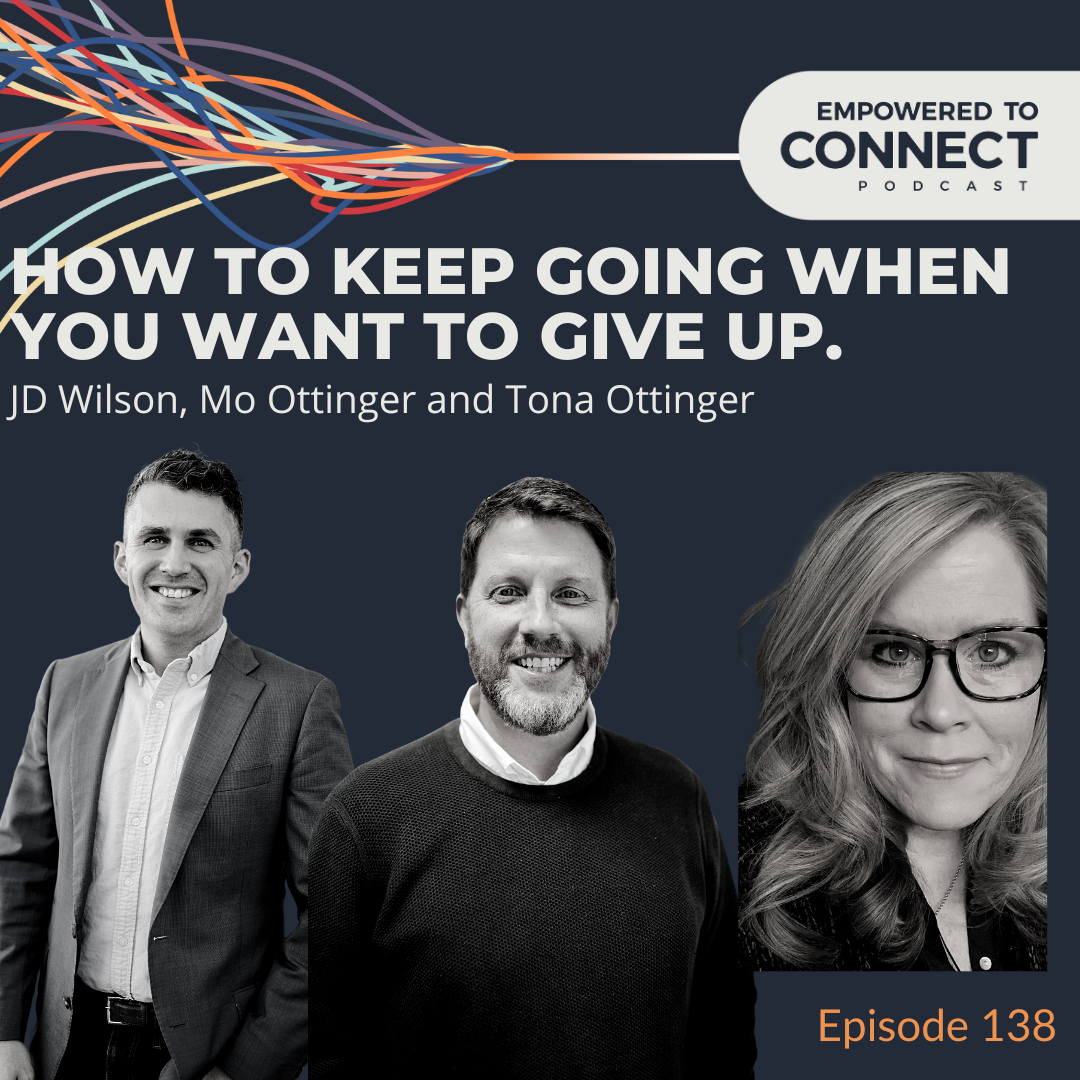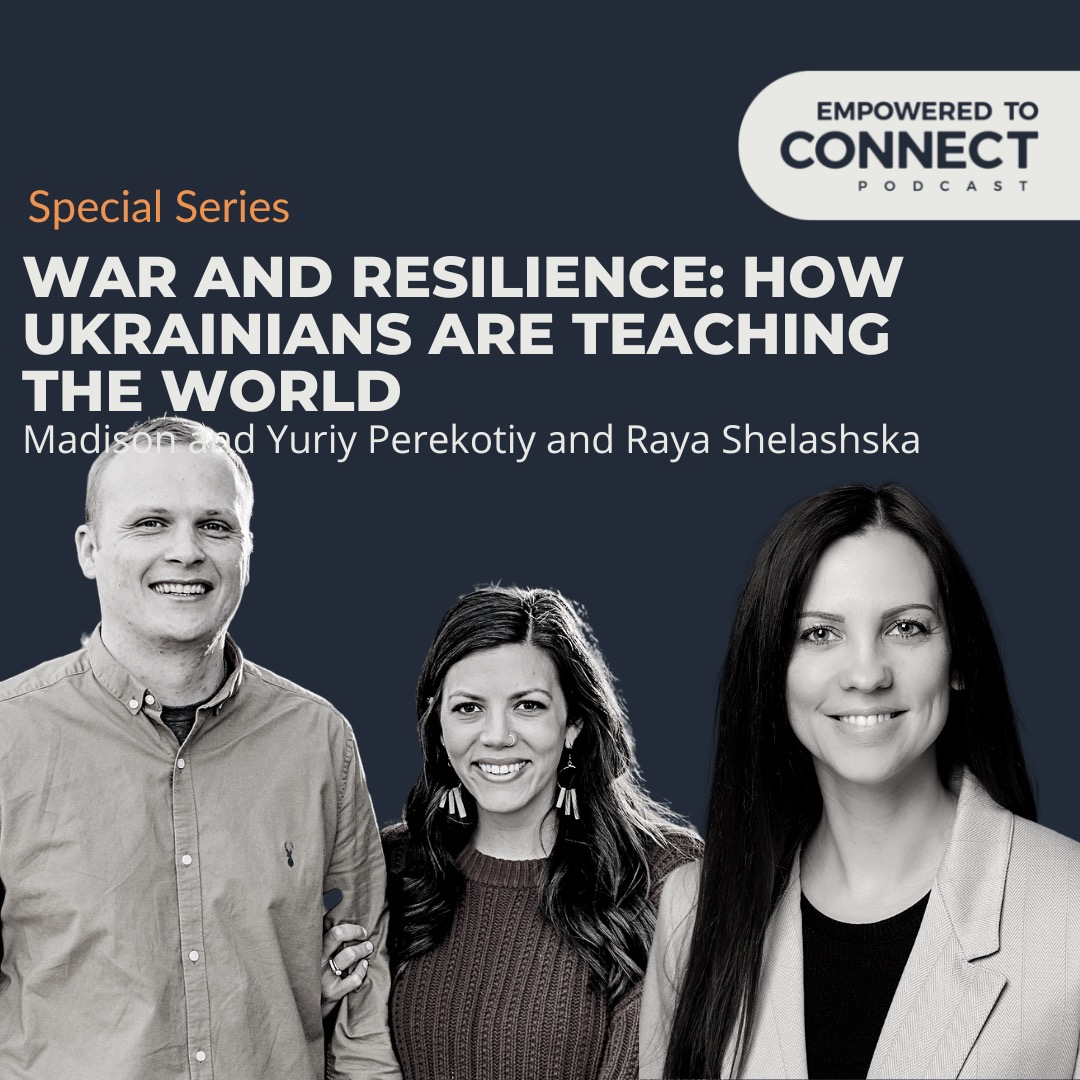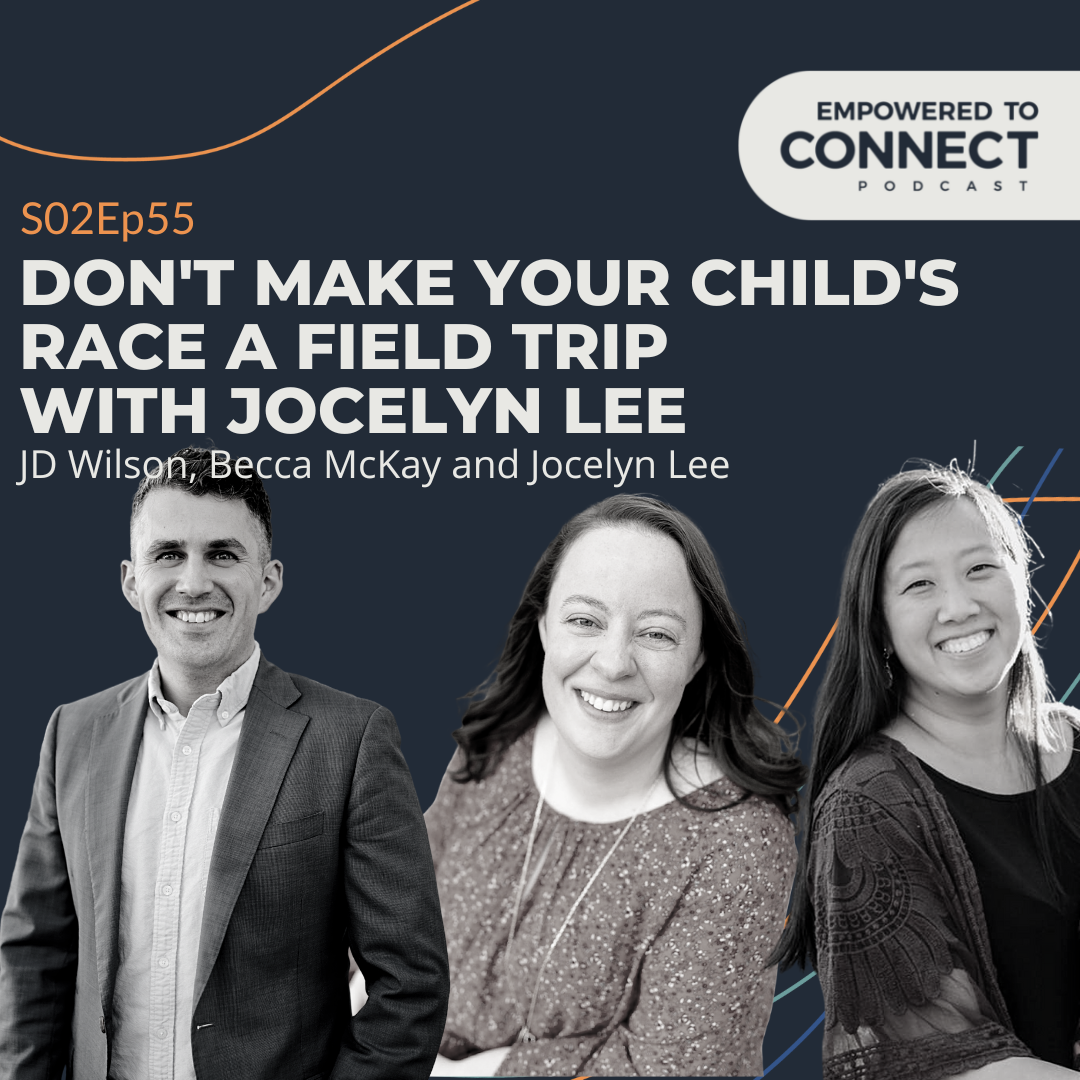Episode Transcript
[00:00:10] Speaker A: Welcome to Carpool Q and A, where we give you one topic, one conversation in 15 minutes ish or less to get your day started. So I'm JD Wilson. I'm your host. And we've got Becca McKay and Tana Odinger with us today to talk about something that Becca is going to bring to us now. So, Becca, what are we talking about today?
[00:00:29] Speaker B: Okay, here's my question for you guys.
What can it look like when we are parenting adultish kids? Okay, so there's like that time period, maybe from maybe starting at like 16, maybe through 30, where people are in different seasons with their kids. And so maybe what can it look like to support young adults? What maybe are just a couple of lessons that we either learn from our own coming of age, or, Tana, from your experience of parenting young adults or, JD, just walking alongside families who are in that some. It's a broad question, but maybe we could just pick a couple things that we wish people would want to know.
[00:01:16] Speaker A: About that I would say, since we don't have young adults yet, I'm actually flawless at this so far. So JD is winning zero young adult parenting mistakes, which means I'm an expert.
[00:01:29] Speaker C: Honestly, winning. And the oddinger's not so.
[00:01:34] Speaker A: Mean. Tana, you need to start this one off honestly. You're the only one.
[00:01:37] Speaker C: Here's so many things that come to my mind and my heart, and I don't mean to go straight to the emotion of it, but this is such a tender and important conversation that, you know, to practice vulnerability. Like, Mo and I are just finding our way through and I think we're finding our way towards some things that hold.
And I think that we're repairing a good bit as we kind of keep walking this out. So just for the listener's sake. Like, our oldest is 23, and then we have a number of other kiddos sort of in their early twenty s, and then we have a couple of kiddos that are like, in their tween years. So we've managed to go through this process with four human beings.
So the thing that comes to my mind, my heart feels tight and heavy because this is such a tender topic and it's so important. So I just want to name that. I'm feeling feelings in my body. Okay? Then my mind says, you cannot control them.
The synthesis of the conversation is there is something so sacred and unique and important and curious and life changing, if you'll let it, about nurturing the journey into adulthood. And our kids have literally changed who we are.
So there's this very reciprocal thing that starts happening. How do you stay in relationship while practicing autonomy and while extending autonomy? How do you take the world in through their eyes and let it maybe challenge and be your guide in some ways that are so beautiful?
And then there are some things about it that are so painful. And so it's this big mixture of glorious struggle.
I didn't know this question was coming, so I didn't have that prepared. Like, you all are just getting literally my real deal feelings. Like, we're right in the throes of it. And I stand in amazement sometimes, like, these are human beings that we've been doing this dance of relationship for years and years and years.
And, man, sometimes it's smooth sailing, and sometimes I have no idea what I should do next. And so that's it.
My principles. I've been talking to a girlfriend about this a lot, like right now, because we're both walking through some things that have some similar things in common. And I talk a lot about how, as a mom, I get to have my own feelings and what does it mean to feel my feelings?
I even get to have my own thoughts. Like, what does it mean to have my own thoughts? But then my principles need to be my guide so I can think things and I can feel big feelings. And then I have to stand back on how do I want to interact? How do I want to respond?
What are the principles that Mo and I value as parents of young adults and to the best of my ability, I need to let those guide my way. That's just how I'm wired. Because if I'm not careful, I'll shut all my feelings down or I'll go into like, a dark hole. And so it's a big thing. Did you mean all that?
That's where Tana was today.
[00:05:37] Speaker B: I had an agenda, and I'll just say it. When I asked that question is just, my cousins are in this season right now of like early twenty s, and they're like, figuring out their way. And it's not in my distant memory of what it felt like to be like, wait, I have to pay my own bills. How do you do taxes? That wasn't that far away for me. And so my agenda was just through our cultivate connection facilitator kind of family.
We talk a lot with parents, and I think so many parents have this idea of what they thought it would be. So my agenda maybe was just to be able to say, you don't know what it's going to look like, and it's going to look different for every kid.
I didn't put a ton of thought into it. We try to do off the cuff with carpal can, but I just keep hearing from parents who are a little bit in, like, a season of, I didn't think it would be like this, and I'll popcorn some examples. I thought they'd be driving by now.
I didn't think they'd still live at home.
I thought they still would live close. I didn't think they'd move across the country.
I thought they would do college like I did, but they decided to do military instead. And that's scary for me. So I'm just like. Those kinds of things are just rolling around in my head of, like you said at the very beginning, tana, it's, you can't control. Like, you can do what you can do.
[00:07:08] Speaker C: That's right.
[00:07:09] Speaker B: And then the other, you know, I think the last thing I want to share is I just had a really sweet weekend with my dad. He came to Memphis to run a half marathon with my husband.
My husband lost his dad a couple of years ago, so it was super meaningful for my dad to come and show up for him in a meaningful way. And I think my dad has shown me there's four of us in my family. We could not be more different in terms of where we live, what we're interested in, what we do. And he has found a way to show up in very unique ways for each of us. And so I think, yeah, I'm talking too much. But that was what was on my mind, was just opening the conversation for people to be like, you guys aren't alone. There's not one way that looks.
[00:07:56] Speaker C: I mean, you hit on something. Go ahead, JD. Yeah.
[00:07:59] Speaker A: What I was going to say is the previous, I don't know, ten ish years I've worked with only young adults from middle school kids, then for a long season of life, like college and young adult age kids. So what I would say, that's obviously not parenting, so you don't have to say that out loud in your car. I know that I'll be the first one to say that now. It's not parenting. You in some ways, get to play a fun uncle role a lot. But one thing that does not change is just that part of the sweetness of that relationship is that it is, on principle, set up without control factors there. Like, I'm just there to offer some wisdom and then just there to kind of offer my help if they need it. And the fact that they're not my kids allows me to play that role a little bit easier, right. To keep my business a little easier. And I have found myself at that. We are just cracking the door into teaching independence in our teens. And even just in this cracking the door, there have been some moments where I have feigned that I am keeping it cool and letting go some control to give them some freedom. It is the hardest thing on earth that I've already ever done. When I've been able to do that, it has borne a lot of fruit. So the answer is not give total freedom, but the answer is to figure out, I think, the ways in which you can do what you can and let go of what you can't control, which is so difficult to do.
[00:09:29] Speaker C: Yeah.
When I said that autonomy, like, how do you stay in relationships that you can't control while having autonomy and maintaining influence?
I mean, you guys, wow, that is such a big thing. And this is where my journey over the last, maybe about two years, in different kinds of ways, has been asking myself that question a lot. And this is where I go back to. Like, I give myself permission to have feelings about things. I don't always ask the kids to hold those right. But if something is hard or I'm grieving a season, like you said, becca, because it wasn't what I thought, or a relationship's changed, or something is just feeling off, or like, I let myself have feelings about it. Not always perfectly, but I try to let mo have his own feelings about it. And we touch base when we can. When we're not too tired, we set dates to talk about things. We'll be like, hey, I don't have the capacity to really work through this tonight, but can we set a date to go have lunch and really talk about this situation or this thing? So we have found ourselves circling back to honestly needing to put things on the calendar to discuss so that we can make sure that we're respecting each other's perspectives as we support our young adults. So that's kind of one thing I would say. If you're struggling, try to set a time to talk to your parenting partner. If that's part of your situation, and then feel your feelings, don't ask them to hold it. Have your thoughts about things. Principles, concepts, ideas. Be curious about theirs. Be willing to listen to their point of view and their perspective on the world. These young adults see things differently than my generation and the generations before, and I want to be willing to hear from them and learn from them and let them be my guide. I don't want to be done growing. And right now, my young adults are Moeni's guide to like, in really holy, sacred, lovely ways. Painful, but so good. Then all of those parenting principles that we learned when our kids were young, those connecting practices, the essence of connected parenting, the essence of cultivate connection. Our course, those things are still true because they're human things. They look so different. What does it mean to balance nurture and structure with a 20 year old that's out of your home that you cannot control? These are the questions I ask, like, what does it mean to offer my presence when I cannot force it? What does it mean to stay in relationship when it doesn't look like I thought? What does it mean to set aside time and input and nurture a child that might be wired very differently than you? All of these things that you're thinking about when they're little are the same things that give you a voice to stay connected when they're older and then just repair and laugh a lot.
This is when they actually get to see you as a human. They've known you were human because they were kids in your home, but now just be really honest about it. So I think sharing in the laughter of yourself, don't take yourself too seriously, and then see them. Like you said, becca, as individuals.
I told you about this friend of mine, and I were talking, and I'm like, I really do have to interact with each one of our older kids very differently than the other.
And if I show up the same way for all of them, I'm going to miss a kid or two in the midst of that. So I call it editing myself, and not in a sacrificial way, but in an attuned, relational way. I want to make sure I'm keeping that young adult in mind and still trying to navigate what they need without them usually being able to articulate it at this age and stage. Still, they can't usually say what they need from a mom and dad because they don't want to need us, so they're pulling away. But there's this little push and pull dance, and it can take you on some mind games.
Anyway, we're just right in the middle of it. I'll probably listen to this little carpal Q and A in ten years and wish I had said some really different things, but that's where we are by that point.
[00:14:13] Speaker A: We'll have new content and we'll share totally.
[00:14:15] Speaker C: I'll be like, oh, girl, you were in the throes of it, and I am.
[00:14:20] Speaker B: I think my closing thoughts as we kind of wrap up here is just, you said it, tana. They don't want to need you at this age. Most kids want to kind of be as independent as possible.
Most kids are fighting for that sense of control over their own life, whatever that looks like. And I think a couple of things.
The stakes are higher, so the mistakes that they make have bigger consequences.
Remember that you can't protect them from everything, which is a really hard thing to remember. And it's so easy for me to say that from my perspective in my season of life, where I don't have personal. But that is real. So your fear is real. Your desire to fix it is real. Your desire to protect them that started when they were little or started whenever you knew them, that is normal and okay. And it makes sense.
When you can honor their independence, do it. When you can offer your presence, do it.
And maybe just really, the only thing I hope people get from this is if you're scratching your head and trying to figure it out. I haven't met a single parent of a young adult who isn't doing the exact same thing.
[00:15:38] Speaker C: Same, 100%. Becca. Literally, we're like, well, we don't know the principles hold, how to apply them for this kid. In this situation, I'm just going to do my best to navigate the waters.
[00:15:52] Speaker A: That's right.
And I think that's maybe the sign that it's working, that you're doing it right.
If you are having to fight with everything, you've got to keep going on and you are self examining, and you and your parenting partner, your team around you are all doing the best you like. When there's that element of struggle there, I think that's a sign at all the stages that you're in it and you're doing the right thing.
[00:16:19] Speaker C: Good question.
[00:16:20] Speaker A: Yeah. Okay.
[00:16:21] Speaker C: Thanks for coming up through my front door today.
[00:16:26] Speaker A: For Becca, for Tana. I'm JD, and we'll see you next week on Carpool. Q A.


